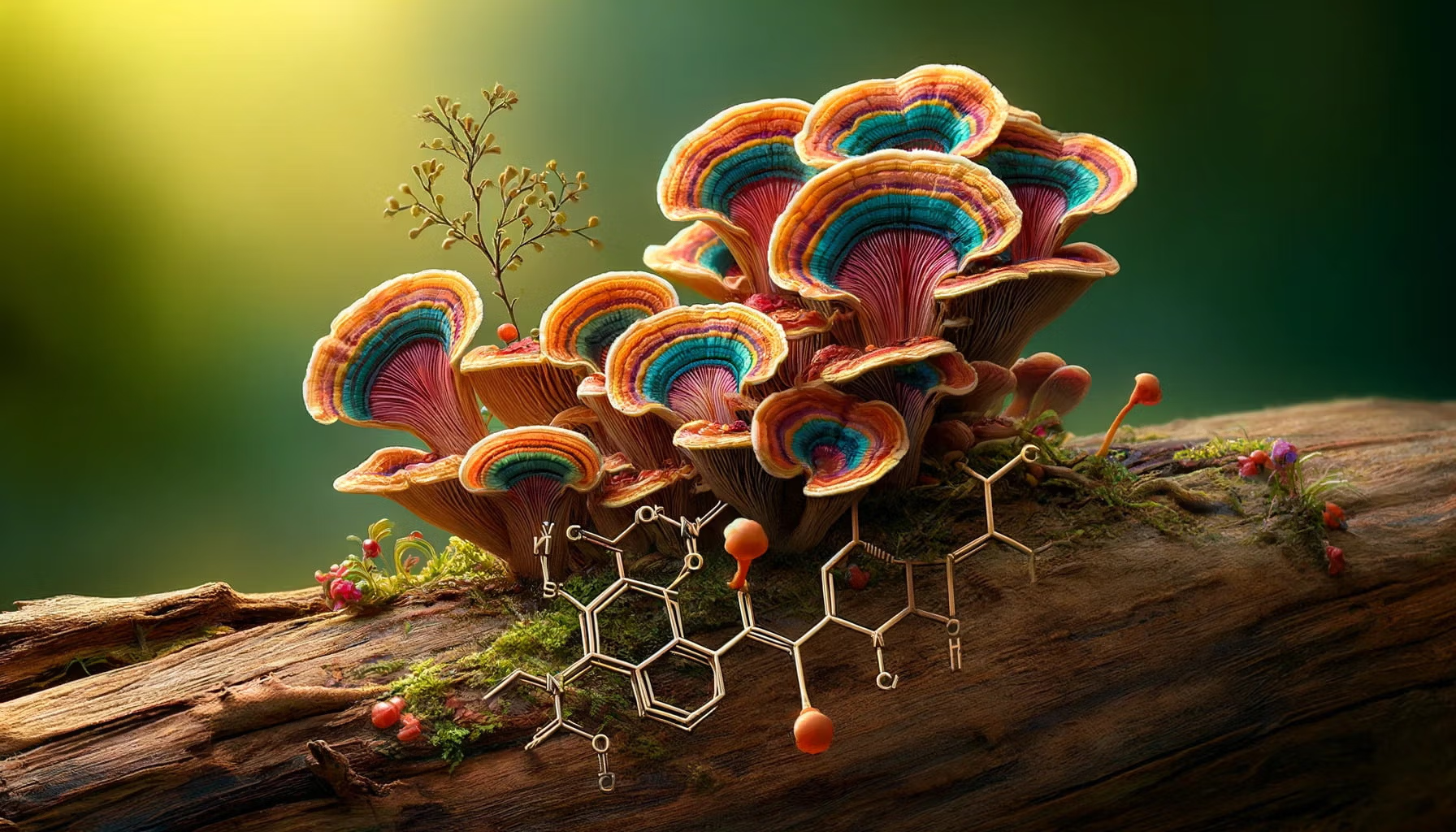
Turkey Tail is a medicinal mushroom with a long history of use in traditional Chinese medicine.
This colorful fungus, named for its resemblance to a wild turkey’s tail, contains a wealth of bioactive compounds that offer neuroprotective and cognitive-enhancing benefits.
In this article shares information on how to use turkey tail as a natural nootropic, its potential side effects and interactions, as well as its benefits and uses in a nootropic stack.
Table of Contents
What is a Turkey Tail Mushroom?

Turkey Tail is a common polypore mushroom found worldwide, named for its striking concentric rings of color that resemble a turkey’s tail.
It grows on dead hardwood logs and is packed with beneficial bioactive compounds like beta-glucans, flavonoids, phenols, and polysaccharides PSK and PSP.
These substances give it potent antioxidant, anti-inflammatory, immune-modulating, and neuroprotective properties.
How Bioavailible is Turkey Tail Mushroom?
Turkey Tail’s active compounds, especially the polysaccharides, are highly bioavailable when properly extracted.
Hot water extraction is the traditional method that breaks down indigestible chitin to increase bioavailability.
Standardized Turkey Tail extracts optimized for PSK and PSP content tend to have the highest bioavailability and potency.
According to research, up to 70% of orally administered PSP is absorbed in the gastrointestinal tract.
The mushroom’s active compounds are readily absorbed in the gut, allowing them to exert their beneficial effects on the body and brain.

What Are the Cognitive and Neurological Benefits of the Turkey Tail Mushroom?
Turkey Tail provides several brain-boosting benefits:
| Benefit | Mechanism |
|---|---|
| Neuroprotection | PSK and PSP protect neurons from oxidative stress and inflammation, which can lead to cognitive decline. |
| Neurogenesis | Turkey Tail stimulates the growth of new brain cells, especially in the hippocampus – the memory and learning center. Increased BDNF levels from PSP promote neurogenesis. |
| Enhanced memory and learning | By reducing neuroinflammation and supporting neurogenesis, Turkey Tail improves memory formation, retention, and recall. Animal studies show PSK and PSP enhance performance on memory tasks. |
| Mood and stress regulation | Turkey Tail’s anti-inflammatory effects may alleviate depression and anxiety. PSP modulates cytokines involved in mood disorders. |
How Does Turkey Tail Enhance Learning and Memory?
Turkey tail mushroom enhances learning and memory through several mechanisms.
According to a study by Food & Function, polysaccharide-K (PSK), a key compound in Turkey Tail, improved spatial memory and learning in mice by reducing oxidative stress and inflammation in the brain.(1)
PSK also increased the expression of brain-derived neurotrophic factor (BDNF), a protein crucial for synaptic plasticity, learning, and memory.
Additionally, Turkey Tail contains antioxidants like flavonoids and phenols that protect neurons from damage caused by free radicals.
A study from 2020 found that Turkey Tail extract exhibited strong antioxidant activity, scavenging up to 94.7% of free radicals in vitro.(2)
Key benefits for learning and memory:
- Reduces oxidative stress and inflammation
- Increases BDNF expression
- Protects neurons from free radical damage
How Does Turkey Tail Support Mood Regulation?
Turkey Tail mushroom supports mood regulation by modulating neurotransmitter levels and reducing inflammation in the brain.
PSK has been shown to increase serotonin and dopamine levels, neurotransmitters associated with positive mood and reduced anxiety.(3)
Moreover, Turkey Tail’s anti-inflammatory properties help alleviate symptoms of depression.
Inflammation in the brain has been linked to the development of depression, and Turkey Tail extract significantly reduced pro-inflammatory cytokines in mice subjected to chronic stress.(4)
Mood regulation benefits:
- Increases serotonin and dopamine levels
- Reduces inflammation linked to depression
- May alleviate symptoms of anxiety and depression
How Does Turkey Tail Contribute to Neurogenesis?
Turkey Tail mushroom promotes neurogenesis, the growth and development of new neurons, by stimulating the production of neurotrophic factors like BDNF and nerve growth factor (NGF).
PSK may increase the expression of BDNF and NGF in the hippocampus, leading to enhanced neurogenesis and improved cognitive function.
Furthermore, Turkey Tail’s antioxidant and anti-inflammatory properties create a favorable environment for neurogenesis by reducing oxidative stress and inflammation that can impair the growth of new neurons.(5)
Neurogenesis benefits:
- Stimulates production of BDNF and NGF
- Enhances growth of new neurons
- Creates favorable environment for neurogenesis
How Does Turkey Tail Enhance Neuroprotection?
Turkey Tail mushroom provides neuroprotection by shielding neurons from various stressors, including oxidative damage, inflammation, and toxins.
The antioxidants in Turkey Tail, flavonoids and phenols, neutralize free radicals that can cause cellular damage and contribute to neurodegenerative diseases like Alzheimer’s and Parkinson’s.(6)
A study by Neuroscience Bulletin found that PSK improved cognitive function and reduced beta-amyloid levels in a mouse model of Alzheimer’s.(7)
Neuroprotection benefits:
- Shields neurons from oxidative damage and toxins
- Reduces inflammation in the brain
- May prevent the accumulation of beta-amyloid plaques

What Are The Side Effects and Risks of Taking Turkey Tail Mushroom?
Turkey Tail is well-tolerated, with few reported side effects.
However, some people may experience mild digestive discomfort, such as bloating or gas, when first taking the mushroom.
In rare cases, allergic reactions may occur, particularly in those with mushroom allergies.
Who Should Avoid Turkey Tail Mushroom?
While Turkey Tail is safe for most people, certain individuals should exercise caution:
- Pregnant and breastfeeding women, due to limited safety data
- Those with autoimmune disorders; Turkey Tail may stimulate the immune system
- People with mushroom allergies or sensitivities
Does Turkey Tail Mushroom Interact With Any Medications?
Turkey Tail may interact with immunosuppressant medications, as the mushroom can enhance immune function.
Those taking blood thinners should also consult their healthcare provider before using Turkey Tail, as the mushroom contains compounds that may affect blood clotting.
What Are the Uses of Turkey Tail Mushroom?
Turkey Tail mushroom (Trametes versicolor) is a popular medicinal mushroom with a variety of applications and uses, such as:
- Immune System Support: Turkey Tail is known for its immune-boosting properties. It contains polysaccharopeptides (PSK) and polysaccharide peptides (PSP), which help stimulate and regulate the immune system.
- Cancer Support: PSK and PSP found in Turkey Tail are used as complementary therapies in cancer treatment. They have been shown to enhance the efficacy of conventional treatments like chemotherapy and radiation by boosting the immune system and potentially inhibiting tumor growth.
- Gut Health: Turkey Tail contains prebiotics that support gut health by promoting the growth of beneficial bacteria in the digestive tract.
- Antioxidant Properties: The mushroom is rich in antioxidants, which help protect the body from oxidative stress and free radical damage.
- Anti-inflammatory Effects: Turkey Tail has anti-inflammatory properties that can help reduce inflammation in the body, potentially benefiting conditions like arthritis.
- Antiviral Properties: Some studies suggest that Turkey Tail may have antiviral properties, helping to combat infections such as the flu and common colds.
What Types of Turkey Tail Nootropics Are There?
Turkey Tail nootropics typically fall into two categories:
- Single-ingredient formulas: These products contain only Turkey Tail extract, often standardized to a specific percentage of PSK or PSP.
- Multi-ingredient blends: Some nootropic supplements combine Turkey Tail with other cognitive-enhancing ingredients, such as lion’s mane mushroom, Ginkgo biloba, or Bacopa monnieri, for synergistic effects.
What is The Recommended Dosage of Turkey Tail Mushroom?
The optimal dosage of Turkey Tail mushroom may vary depending on the specific product and individual needs.
However, most studies have used daily doses ranging from 1,000 to 3,000 mg of Turkey Tail extract, typically divided into two or three doses.
When starting with Turkey Tail, it’s best to begin with a lower dose and gradually increase as needed and tolerated.
Always follow the manufacturer’s recommended dosage instructions and consult a healthcare professional before adding Turkey Tail to your nootropic regimen.
Can Turkey Tail Be Used in A Nootropic Stack?
Yes, Turkey Tail mushrooms can be effectively incorporated into a nootropic stack for enhanced cognitive performance.
Its unique combination of nootropic properties, including improved learning and memory, mood regulation, neurogenesis, and neuroprotection, make it a valuable addition to any brain-boosting regimen.
Turkey Tail can be combined with other nootropics that support similar cognitive functions for synergistic effects, such as:
- Turkey Tail + Lion’s mane: Enhanced neurogenesis
- Turkey Tail + Omega-3s: Enhanced neuroprotection and reduced inflammation
Start with low doses (500-1000 mg/day) and titrate up as needed.
What Are the Uses of Turkey Tail Mushroom?
Turkey Tail mushroom (Trametes versicolor) is a popular medicinal mushroom with a variety of applications and uses.
Here are some of the most notable ones:
- Immune System Support: Turkey Tail is known for its immune-boosting properties. It contains polysaccharopeptides (PSK) and polysaccharide peptides (PSP), which help stimulate and regulate the immune system.
- Cancer Support: PSK and PSP found in Turkey Tail are used as complementary therapies in cancer treatment. They have been shown to enhance the efficacy of conventional treatments like chemotherapy and radiation by boosting the immune system and potentially inhibiting tumor growth.
- Gut Health: Turkey Tail contains prebiotics that support gut health by promoting the growth of beneficial bacteria in the digestive tract.
- Antioxidant Properties: The mushroom is rich in antioxidants, which help protect the body from oxidative stress and free radical damage.
- Anti-inflammatory Effects: Turkey Tail has anti-inflammatory properties that can help reduce inflammation in the body, potentially benefiting conditions like arthritis.
- Antiviral Properties: Some studies suggest that Turkey Tail may have antiviral properties, helping to combat infections such as the flu and common colds.
- Mo, Cuiyuan et al. “Polysaccharide from Pleurotus tuber-regium mycelium improves DSS-induced colitis in mice by regulating inflammatory cytokines, oxidative stress and gut microbiota.” Food & function vol. 15,7 3731-3743. 2 Apr. 2024, doi:10.1039/d3fo05583c↩
- Miletić D, Turło J, Podsadni P, Sknepnek A, Szczepańska A, Lević S, Nedović V, Nikšić M. Turkey Tail Medicinal Mushroom, Trametes versicolor (Agaricomycetes), Crude Exopolysaccharides with Antioxidative Activity. Int J Med Mushrooms. 2020;22(9):885-895. doi: 10.1615/IntJMedMushrooms.2020035877. PMID: 33389854.↩
- Zhao, Rui et al. “Improving Activity of Lycium Barbarum. Polysaccharide on Depressive Mice Induced by Reserpine.” Iranian journal of pharmaceutical research : IJPR vol. 18,3 (2019): 1556-1565. doi:10.22037/ijpr.2019.1100763↩
- Venturella, Giuseppe et al. “Medicinal Mushrooms: Bioactive Compounds, Use, and Clinical Trials.” International journal of molecular sciences vol. 22,2 634. 10 Jan. 2021, doi:10.3390/ijms22020634↩
- Benson, Kathleen F et al. “The mycelium of the Trametes versicolor (Turkey tail) mushroom and its fermented substrate each show potent and complementary immune activating properties in vitro.” BMC complementary and alternative medicine vol. 19,1 342. 2 Dec. 2019, doi:10.1186/s12906-019-2681-7↩
- Janjušević, Ljiljana et al. “The lignicolous fungus Trametes versicolor (L.) Lloyd (1920): a promising natural source of antiradical and AChE inhibitory agents.” Journal of enzyme inhibition and medicinal chemistry vol. 32,1 (2017): 355-362. doi:10.1080/14756366.2016.1252759↩
- Chen, Si-Han et al. “Polysaccharide Krestin Prevents Alzheimer’s Disease-type Pathology and Cognitive Deficits by Enhancing Monocyte Amyloid-β Processing.” Neuroscience bulletin vol. 38,3 (2022): 290-302. doi:10.1007/s12264-021-00779-5↩

